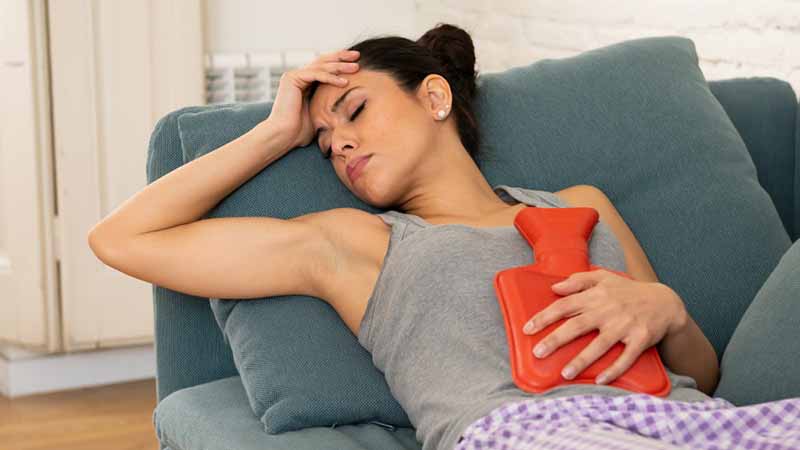Pre-Menstrual Syndrome (PMS): How To Deal With It?
- 38 months ago
What is premenstrual syndrome or PMS? How can you diagnose and treat the same? Well, if you have these questions in mind, this blog is for you. Here we'll discuss all the things you need to know about PMS from its diagnosis, causes to treatment, and PMS symptoms.
What Is Premenstrual Syndrome?
Premenstrual syndrome or PMS is a combination of symptoms that females experience a week or two before their periods. Over 90% of women say that they experience PMS symptoms such as moodiness, headaches, and bloating.

Some women consider PMS symptoms severe and skip office or school on their onset. However, some women consider it normal and aren't bothered by mild symptoms.
Common Symptoms Of Premenstrual Syndrome
There are two types of symptoms of Premenstrual syndrome:
- Emotional/Behavioral
- Physical
Emotional/Behavioral Symptoms
- Poor Concentration
- Social Withdrawal
- Crying Spells
- Change In Appetite
- Mood Swings
- Depression
- Anxiety
- Stress
Physical Symptoms
- Alcohol Intolerance
- Diarrhea
- Constipation
- Acne
- Cramps
- Breast Tenderness
- Fatigue
- Headache
- Weight Gain
- Bloating
What Are The Most Common Causes Of Premenstrual Syndrome?
Researchers aren't aware of the exact reasons behind PMS. However, here are some common causes that might lead to premenstrual syndrome symptoms:
Hormonal Changes
Hormonal changes can sometimes lead to or modify the symptoms of PMS. Common conditions when hormonal changes occur in women are during menopause and pregnancy.
Chemical Changes In Your Brain
Serotonin is a neurotransmitter/brain chemical that plays an important role in mood states. And fluctuations in serotonin in your brain may trigger PMS symptoms. Also, inadequate amounts of serotonin in your body can lead to fatigue, depression, sleep issues, and even food cravings.
Depression
Several women experiencing premenstrual syndrome were found to have depression. Although depression is not the only cause for all PMS symptoms, it can still lead to some of them.

How Long Does PMS Last?
The PMS symptoms can start appearing two weeks before the period begins. And in most cases, these symptoms stop within the four days of commencement of the period—also, women in their 30s or 40s or the ones approaching their menopause experience PMS symptoms.
How To Reduce PMS Symptoms Naturally?
Here we'll talk about some natural ways of dealing with premenstrual syndrome.
Consume A Well-Balanced Diet For Easing PMS Symptoms
A nutrient-rich diet is essential to keep you active and energized during the day. Research says that a diet that is rich in Vitamin D and calcium can significantly reduce PMS symptoms. Also, diets rich in riboflavin (B2) and thiamine (B1) can help reduce the risk of PMS altogether.
Furthermore, you should avoid excessive consumption of sugar, salt, and caffeine. This also holds the potential to relieve PMS symptoms.
Include Regular Workout In Your Daily Routine For Easing PMS Symptoms
Regular exercise, as you may know, brings hundreds of benefits. It helps you stay active, gets the juices in your body flowing, and ensures overall wellbeing. What's more, regular exercise can help you deal with back pain during menstruation, reduce headache, vomiting, constipation, and even diarrhea.
So, make sure to exercise daily to reduce PMS symptoms.
Sleep Well For Easing PMS Symptoms
Lack of sleep leads to several issues such as fatigue, tiredness, or even anxiety and depression in some cases. And all this can make the PMS symptoms such as moodiness quite verse.
So, make sure to get at least 6-8 hours of sleep each day.
Deal With Stress For Easing PMS Symptoms
Stress is not good for anyone in any condition, let alone with PMS. However, if you frequently get stressed or irritated with the onset of PMS, try reducing your stress. Otherwise, you might experience burnout or even end up heightening the PMS symptoms.
For reducing stress, you can try meditation, cognitive behavioral therapy, yoga, etc. You can also go for professional assistance if you're experiencing chronic stress.
Quit Smoking For Easing PMS Symptoms
You must immediately quit alcohol and smoking if you want to deal with PMS. It's because a study reported that women who smoke experience worse PMS symptoms as compared to the women who don't.
What Are Some Other Ways Of Dealing With PMS Symptoms?
Here are some other ways or medications you can use for easing PMS symptoms:
- Antidepressants such as Prozac, Paxil, Pexeva, Sarafem
- NSAIDs such as Ibuprofen
- Diuretics such as Spironolactone
- Some Hormonal Contraceptives
Before consuming any of the above medications, make sure to consult with your gynecologist.
Wrapping Up
Pre-Menstrual Syndrome is quite a hassle on top of the pain and blood loss that the menstruation phase brings for women. Although there isn't a specific medicine to deal with PMS, you can still go for the above-mentioned natural remedies that can help you reduce the intensity of PMS symptoms.








